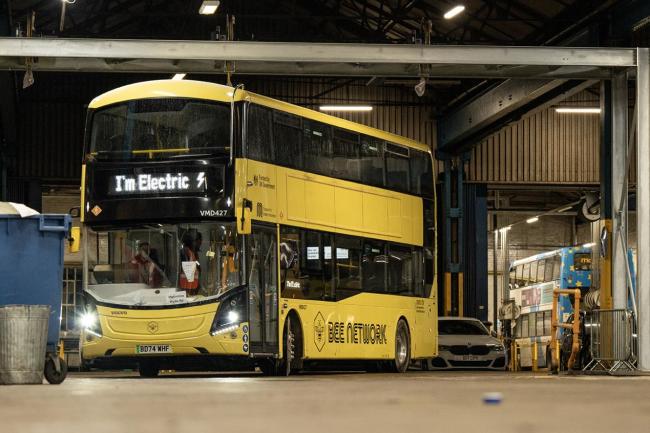
- City-region makes history, bringing buses under local control on time and budget
- Mayor marks ‘historic moment’, and says 2025 will see unrelenting focus on delivering ‘London-style’ transport system to drive economic growth and productivity
- Represents nationally significant moment for other areas looking to regain control of buses, as leading think tank says learning from Greater Manchester could kickstart a strong renewal of local buses in England
- More people now travelling on cheaper, cleaner and greener buses - reversing decades of decline and connecting communities better than ever before
Greater Manchester has heralded a new era in public transport, transforming how people get around the city-region.
Following a phased approach, all bus services – totalling 577 routes, 1,600 buses and accounting for more than 160 million trips per year – are now under local control and accountable to the people, businesses and communities of Greater Manchester.
Making history as the first area in the country to do this in 40 years, Greater Manchester has taken steps to reverse decades-long decline to deliver improved services, better buses and more affordable fares, including:
- Better connections: Making changes to around 75 different routes to provide earlier, later, more frequent and better-connected services; the first new Bee Network service and night bus pilot services. Ongoing reviews will ensure the Bee Network makes it easier for people to get where they need to go through affordable, joined up, reliable services.
- More reliable services: Punctuality of the first buses to come under local control is now consistently above 80% (up from c.69% on the pre-franchised network). Reliability in the second area – Oldham, Rochdale, Bury, Salford, and north Manchester – is also better than before, with work ongoing to replicate the improvements seen in phase one areas across the whole network.
- A step-change in the standard of buses: Hundreds of new, greener and more accessible vehicles are now on the roads. By the end of March 2025, more than half (52%) of Bee Network buses will be new and 75% of the fleet will be less than four years old (compared to an average fleet age of 9.5 years in 2019). The number of electric buses in the fleet also continues to grow rapidly, from fewer than 1% before franchising to 25% from April 2025.
- Affordable fares: Average ticket costs reduced by 15% with the £2 fare that will remain in place throughout 2025. A cheaper, simpler fare structure is now in place across all Bee Network buses – with new products including a ‘hopper’ fare, reduced weekly and monthly ticket, and passengers able to spread the cost of an unlimited annual ticket with participating credit unions. Contactless capping across bus and tram – where people can tap and go and have the correct fare worked out for them automatically – is also coming from 23 March 2025.
- Jobs and opportunities: The Bee Network has created hundreds of jobs and new opportunities in Greater Manchester and across the UK, with contracts to operate franchised services and orders for hundreds of new buses manufactured in Britain.
All delivered on time and on budget, with a 5% increase in passengers over a 12month period, revenues above forecast and the cost of running franchised services reduced by a third (compared to having to intervene in the private deregulated market), Greater Manchester is setting the blueprint for others to follow.
Completion of bus franchising marks the end of phase one of the Bee Network, with the same focus and momentum now being applied to transform rail travel across the city-region. The next step will be to bring eight priority train lines into the Bee Network by 2028, as well as deliver the first new stations in more than 20 years and significant upgrades to make more stations accessible.
Mayor of Greater Manchester, Andy Burnham, said:
“This is an historic moment for Greater Manchester. We are proud to be the first area in England to complete the re-regulation of buses and to have done it on time and on budget.
“From today, every community in Greater Manchester will be served by cheaper, cleaner and greener buses and run in a way which puts people before profit. We are now ready to help other areas looking to follow suit and improve their bus services after decades of decline.
“Greater Manchester is currently the growth success story of the UK. We have an £80bn economy, a growing population and world-leading businesses, and our rate of growth is outstripping that of the South East. But we’ll only be able to reach our full potential, and make life better for all our residents, with a world-class public transport system.
“Whilst this is a nationally significant moment that we can all celebrate, it’s by no means job done. We'll have an unrelenting focus this year on delivering a truly integrated, London-style transport system across bus, tram and train - the next chapter of the Bee Network’s story.”
The Bee Network is integral to the overall success of the city-region and Greater Manchester’s strategy to support a growing population by building 175,000 new homes and creating 100,000 new jobs.
Other regions are already taking steps to regain control of buses, and the government is introducing new legislation to make it easier for other areas to follow in Greater Manchester’s footsteps.
Secretary of State for Transport, Heidi Alexander, said:
“Greater Manchester’s Bee Network is a trailblazer in delivering better bus services for passengers and we want local authorities across the country to look to it as a shining example of what can be achieved through local control.
“This Government has prioritised supporting and improving bus networks across the country as we know how important they are for communities – but for too long, too many people have suffered from unreliable and infrequent services.
“People across Greater Manchester now have buses they can depend on. With our Bus Services Bill and £1 billion in support for services across the country, we will help ensure that similar success reaches across the country.”

